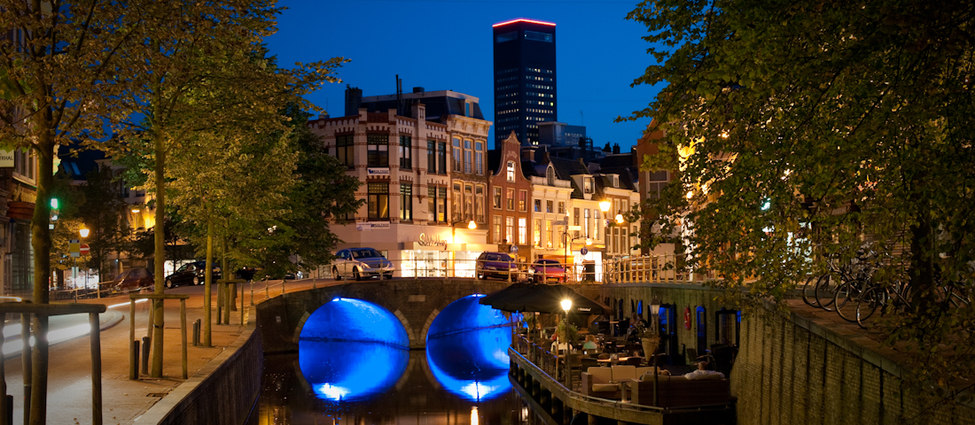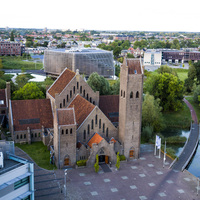

News

Dutch water technology conquers the world

Something extraordinary is happening in Leeuwarden. The Friesian capital has quietly grown into the epicentre of innovative water technology. The Leeuwarden Water Campus is the breeding ground for numerous technological innovations and successful water start-ups. The city, province, water technology sector and educational institutions work together intensively. The Water Alliance helps companies to bring their innovations to the market faster.
The Water Alliance , member of WTC Leeuwarden, was set up more than ten years ago as a network organisation for the water technology industry. The organisation, which originally started as a northern initiative, now fulfils a nationwide role with global connections, says managing director Hein Molenkamp. The Water Campus in Leeuwarden was chosen as the location for the event because of the presence of Wetsus , the largest research centre in the field of sustainable water technology. "Wetsus is a world-renowned research institute. It is the scientific foundation of the Water Campus. Universities from all over Europe carry out research in cooperation with the business community in the Wetsus laboratory.
Niche character
Asked about the core of the Water Campus's success, Molenkamp answers: "We are able in a down-to-earth way to complement complex university research with applied research, including the CEW (Centre of Expertise Water Technology). We are also intensively involving intermediate and higher vocational education, after which companies will eventually take the technology to the global market. The philosophy behind the Water Campus is how, through intensive cooperation, we can play a role in accelerating the development and scaling up of ideas via research and applied research into marketable technology. Selling and exporting new technology is very nice, but the road to it is often long. There are many examples of new water technologies that took at least ten to fifteen years to develop before they became commercially successful." A characteristic of Dutch water technology is that it is mainly SMEs, Molenkamp explains. "Some companies have grown just a bit above SME level, but the majority are more between 5 and 60 employees. Many of these companies are very export-oriented. The Dutch market for their specific technology is small, due to its niche nature, so as an entrepreneur you soon look across the border. The market for new solutions to the ever-growing global demand for water is enormous."
Wastewater
On the Water Campus, science and business work together on numerous challenges, such as new processes for clean drinking water, the purification of waste water, recovering useful substances from water to industrial applications and even sustainable energy production such as Blue Energy on the Afsluitdijk.
There are several examples of successful innovations and start-ups that illustrate the Water Campus. One example is the company Hydraloop , also a member of WTC Leeuwarden. The idea started with a resident of Muiderberg, who developed a device in his garage that reuses wastewater in the home, reducing the need to dispose of wastewater by half. "He came into contact with us a few years ago. That product was fairly well developed, but many steps are needed before you can take your technology to the market. They have established themselves at the Leeuwarden Water Campus and we have taken the company to various major exhibitions in cities including Amsterdam, Abu Dhabi and Chicago. They also participated in various innovation competitions. The highlight was the CES in Las Vegas in 2020 where they received the highest innovation award. That generates a lot of attention. We put them in touch with a network organisation friend of ours in the US, where they eventually opened their first office, to get a foothold in North America. That's the role of Water Alliance. We connect parties."
At the same time, Hydraloop had to start production. "Through our relationship with the NOM (Investment and Development Agency for the Northern Netherlands), they were put in touch with Technologies Added in Emmen, a turnkey factory where they could set up their own production line. For such a start-up, that is a welcome addition."
The government also supports the innovations, Molenkamp says. For example, the municipality of Leeuwarden is the first in the Netherlands to make a subsidy available for installing a water-recycling system in houses. In a neighbourhood in the Frisian capital, such a system has already been installed in dozens of homes. Molenkamp: "That is very important for a starting entrepreneur, that you have a platform nearby to launch your product, so that you can prove that your idea works. The region is very committed to providing such a platform for new technology. Hydraloop is a great example of that."
Another company Molenkamp likes to mention is Wafilin Systems . The company specialises in purifying water from industries by means of membranes. One of its customers is Avebe , which produces potato starch. "That process is becoming increasingly circular. Together with Wafilin Systems, for example, they have developed a technology whereby protein is extracted from the process water by means of a special membrane technology. As a relatively small SME, they are still able to carry out a project of around 6 million euros through intensive cooperation with numerous supplying companies. Personally, I find that one of the fascinating things about my job. You see that companies that develop high-grade water technology work together with numerous supplying manufacturing companies to carry out projects. If that succeeds in the Netherlands, the door to global expansion is open. And that is good for Dutch business."
Hub
Water Campus Leeuwarden is the hub of the Dutch water technology sector. It has the ambition to fulfil this role for the whole of Europe, thus strengthening the position of European water technology.